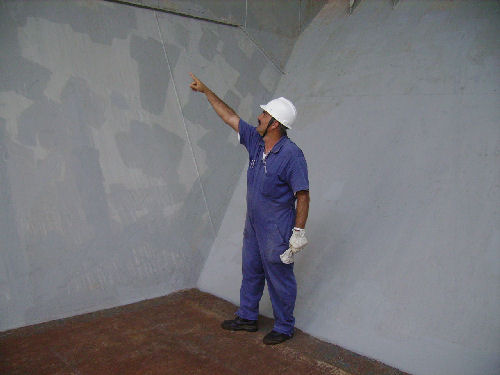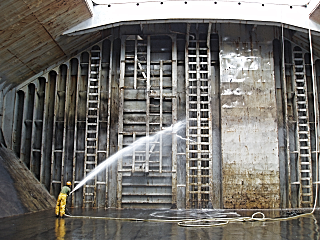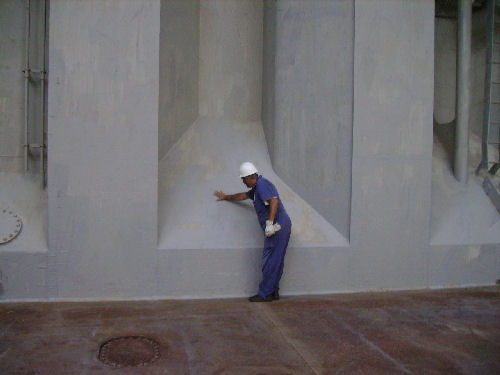
- •Vocabulary
- •Sweep, stow, remove, rinse, support, taint, promote, prevent, facilitate, dry, wash, mop out, ventilate.
- •Later, after that, then, in some days…
- •Cleaning of Holds
- •Allow Sufficient Time Or It Will Be Costly
- •Topic 2 Stop-loss Practice
- •If you worked on a bulker speak about real safety precautions as to the cargoworks.
- •What will such practice lead to?
- •Loading Cement: Make Sure You Clean Up After Loading
- •Word List Unit 1 Bulk Cargo Handling
Unit 1
Bulk Cargo Handling
You will be able to: discuss hold clean-up operations; discuss bulk cargo handling procedures; explain the most frequent causes of bulk cargo damage and discuss how to avoid them; use SMCP for bulk cargo handling.
Topic 1
Hold Maintenance
Starter
Why is it obligatory to clean the hold before loading and after discharging?
What can happen if the hold is not ready for the next cargo?
Describe the pictures.
a |
___________________________________ ___________________________________ ___________________________________ ___________________________________ |
b
|
____________________________________ ____________________________________ ____________________________________ ____________________________________ |
c
|
____________________________________ ____________________________________ ____________________________________ ____________________________________ |
Discuss.
If |
cargo spaces must be inspected regularly. |
inspection is done only by specialists. |
|
all detected faults must be eliminated. |
Vocabulary
1 a) Circle the verbs denoting cleaning aspects only.
Sweep, stow, remove, rinse, support, taint, promote, prevent, facilitate, dry, wash, mop out, ventilate.
b) Check the meaning of the verbs with the dictionary.
c) Choose two verbs to give the definitions for others to guess.
2 a) Make the proper statements.
After discharging
|
grain sulphur petcoke bulk cement coal salt soda ash fertiliser woodchips |
I must |
rinse wash dry sweep remove mop out ventilate |
the hold(s). |
Before loading |
3 a) Check it if you remember Past Simple.
b) Write the past forms of the verbs from activity 2.
__________________
__________________
__________________
__________________
__________________
__________________
__________________
c) Make a chain-story using the verbs above to describe a very intensive voyage.
Later, after that, then, in some days…
Reading
4 In groups, make a list of purposes the hold cleaning serve.
5 In pairs, check the meaning of the word-combinations in bold type.
Cleaning of Holds
Before the ship can load her next cargo, the cargo hold must be adequately cleaned. The degree of cleanliness will depend on the nature of both the previous cargo and the next cargo.
Hold cleaning serves a number of purposes such as:
1. Facilitating inspection of the ship's structure, in order to detect any damaged part clearly;
2. Removing sources of combustion;
3. Promoting the free flow of moisture towards bilges and wells;
4. Preventing contamination of next cargoes;
5. Preventing the development of unsanitary conditions.
For break bulk cargoes and some dirty dry-bulk cargoes, it may be sufficient for the holds to be swept by the crew. For cleaner dry-bulk cargoes, the holds may be washed out with high-pressure hoses to remove all traces of the previous cargo. It is good practice to rinse the holds with fresh water after washing with salt water in order to minimize any future corrosion. Also, this may be essential if the next cargo can be damaged by salt. The highest standards of cleanliness are usually referred to as ‘grain clean’, which may be required for sensitive cargoes such as grain and other victuals.
For most cargoes, the holds must be dry and free from odours, which may taint the cargo. On reefers, it is particularly important that all traces of odours from previous cargoes are removed using an 'ozonator' to remove toxic gas in the hold.
The holds should be free from all loose rust which may contaminate certain sensitive cargoes. Some inspections may require the hold to be specially coated with lime for salt or sulphur cargo.
6 Read the text and underline all measures to be taken for hold cleaning.
7 Correct the mistakes made by the deck cadets.

8 Complete and give some advice.
1. To clean the holds it may be sufficient _____________________________________them.
2. To remove all traces of the previous cargo you should _____________________________________________________________________________.
3. To transport salt and sulphur cargo you’d better _____________________________________________________________________________.
4. To minimize any future corrosion it’s recommended ____________________________________________________________________________.
5. To remove all traces of odours and toxic gas you must _____________________________________________________________________________.
6. To transport sensitive cargoes you should _____________________________________________________________________________.
9 Discuss.
WHY…
must all sources of combustion be removed from the holds?
must there be a free flow of moisture towards bilges?
must unsanitary conditions be prevented?

10 Read the case and answer.
a) How many times were the holds cleaned?
b) What was the demurrage time?



